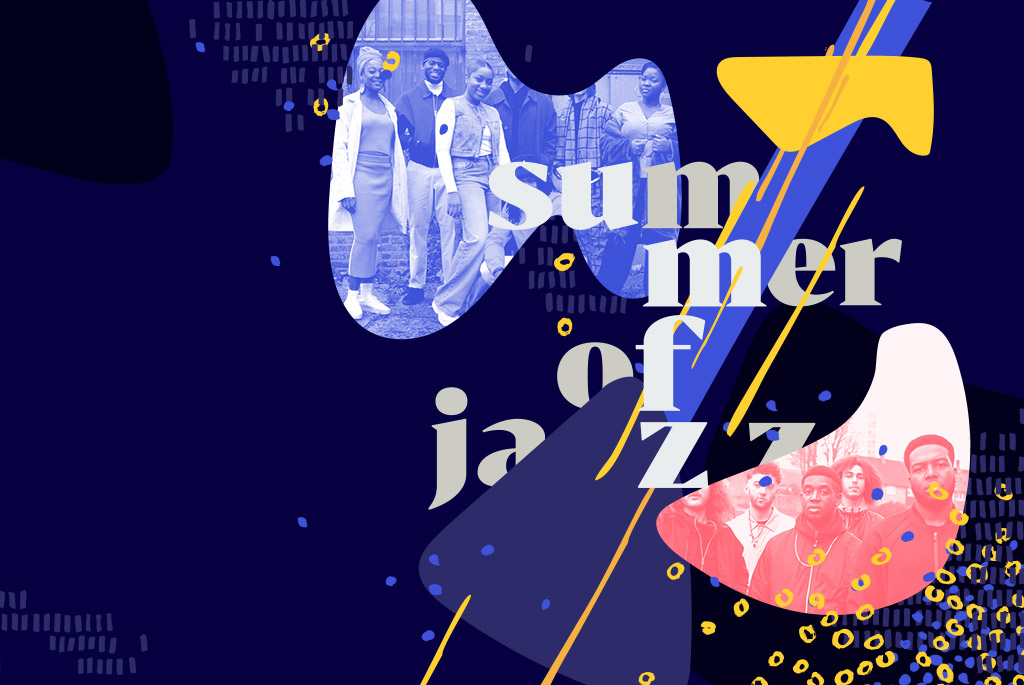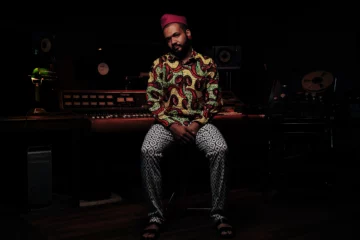»The whole landscape has changed, before venues and night world were quite separate. Put in simple terms, jazzers were doing jazz and other people were off doing things that were considered totally different. In the last five years things have become more broad and integrated«, Moses Boyd recalls in an interview with The Guardian. The drummer is at the core of London’s DIY-jazz scene at the moment and together with his colleague and saxophonist Binker Golding makes up the duo Binker & Moses. He like many others knows: Besides its cosmopolitan flair, the club landscape in the city was at one point in time quite separated, both culturally and musically. One the one side venues for the intellectual listener, who listens to jazz and experimental music. On the other clubs where one could dance to UK bass, grime and hip hop – here the supposed old and pretentious sound, there the hip new musical styles. Since 2010, Boiler Room is active in bringing both together on an increasingly international scale. Also NTS Radio, founded in 2011 by Femi Adeyemi and labels like Eglo, Total Refreshment Centre or Gilles Peterson’s Brownswood Recordings are eager to merge different musical cultures and styles that thrive in London, Manchester or Sheffield – not just because of great musicians, but also because club owners and organizers are taking a stand against the pressure of public authorities.
»There is certainly the audience there in London for experimental improv music of all kinds but it’s really really hard to fight many council’s repressive policies that seek only to shut down live music as completely as possible. I have huge respect for the venue owners they are making the impossible happen quite often!«, says Idris Rahman, saxophonist for Ill Considered, one of the most active projects in London at the moment. The four-piece combo consists of the core members Rahman, Leon Brichard, Emre Ramazanoglu and Satin Singh, all of which know each other well but only play together for little more than two years. Yet they managed to release five studio albums and four live albums in this time – all of it without a label, single-handedly distributed via Bandcamp.
»There are no downsides for us aside from it’s a huge amount of work, mainly for Leon who packs and ships all records manually and deals with all the distribution. It’s a mammoth undertaking but it seems to be working!« The effort seems to be worth it, even financially without ever compromising the artistic freedom or being confronted with the accusation of »selling out«. »Bandcamp is an incredible, empowering platform and is at the core of our model because we can release what we want, when we want and how we want it!« Of course, the Ill Considered crew is not the only one using the fresh possibilities of social media and online music platforms. Other musicians are also involved and often know each other from multiple projects. For example Rahman and Brichard cooperate with Sons of Kemet drummer Tom Skinner for the spiritual jazz of Wildflower, while Skinner and Satin Singh together with Shabaka Hutchings constitute the afrobeat/punk setup Melt Yourself Down, with its wild rhythmic climaxes.
»There is certainly the audience there in London for experimental improv music of all kinds but it’s really really hard to fight many council’s repressive policies that seek only to shut down live music as completely as possible.«
Idris Rahman of Ill Considered
Even on the surface, the whole scene is intricately intertwined, which is pretty visible in the figure of Hutchings. The sax virtuoso released a memorable debut under the moniker Shabaka And The Ancestors, for which he teamed up with befriended musicians from South Africa. The result was one of the most fascinating releases of this curious British jazz revival taking over the scene at the moment. Before that, he contributed with his versatile sax style to the gloomy debut of Zed-U (“Night Time On The Middle Passage”) and made a name for himself as a gifted clarinetist on “Step Wide, Step Deep” by the Alexander Hawkins Ensemble. Whether funk or space rock, afrobeat or avant-garde jazz: Hutchings is taking in all these various musical synergies from his creative environment as fluently as ideas from the internet or festivals he plays at. Other musicians such as Mansur Brown or Kamaal Williams are developing their style in a similar fashion, just like the whole musical milieu in which they grew as artists over the last years and in which a certain DIY attitude got paired with a growing lust for experiment, which has in one form or another existed at least since the early 90s. After all, acid jazz and grime, jungle and UK bass came from the urban centers of Britain and were commercial as well as cultural export hits. Many artists who are rising in the current environment know this and naturally grew up with albums like Dizzee Rascals »Boy In Da Corner«, which was named by Moses Boyd as an early influence while pianist Kamaal Williams and drummer Yussef Dayes like to name the broken beats of Neon Phusion or 4 Hero as a seminal creative experience. Gilles Peterson’s eclectic DJ-mix »INCredible Sound Of Gilles Peterson« from 1999 can be considered an anticipation of the current state of affairs within the British scene, complementing Acid Jazz with Downtempo and Dub, but also considering Funk, House and Soul as fitting elements for new eclectic styles of music.
You can find Jazz from Great Britain on Vinyl record in our [HHV webshop](https://www.hhv.de/shop/en/british-jazz/i:D2N4S12SP12732)
In many ways, Peterson is one of the busiest personalities in the British music sphere and is active since the late 80s, when he was involved in the establishment of labels like Acid Jazz or Talkin’ Loud. Both essential for the development of the London underground since the 90s but because of some kind of trickle-up effect also for British commercial chart music of those days. Most albums by Japanese acid jazz trio United Future Organization were released via a sub-label of Talkin’ Loud, called Brownswood Records instead of Recordings. Other artists like Incognito, Galliano, Roni Size, Urban Specia and 4 Hero made Talkin’ Loud an important musical focal point. With Brownswood Recordings, Peterson is working very effectively on the consequent continuation of his artistic philosophy as DJ, producer and label owner. From Ghostpoet to Zara McFarlane, from Mala to the *Owiny Sigoma Band**, to Yussef Kamaal as well as the already mentioned Shabaka and the Ancestors, Brownswood Recordings is pushing new talents with reliable regularity. What was bubbling beneath the surface for a while is coming to the surface for the better part of a decade now.
»In a way, Britain is so hungry for culture and music culture that it can act as a catalyst to awaken music which is lying dormant in America but can become huge there on the back of becoming big here in England. And I think that a lot of artists, whether it’s The Roots or Mos Def or Madlib or J Dilla – all these slightly left of center groups from America always did really well in Europe and the UK before it got retaken by its home. And I think that’s what’s happening with jazz right now and what happened for many years in a way.« After bringing Brownswood to the forefront of everything jazz in the UK, Peterson got the opportunity to curate his own program at BBC Radio 6 Music. As a passionate vinyl collector, producer and creative globetrotter he is mixing myriads of styles from afrobeat and Brazilian pop to jazz in every thinkable way to soul, hip hop, breakbeat and house, reaching millions of listeners at once. Meanwhile the scene is not only as tightly linked as Peterson himself but also likewise open-minded. Which is noticeable on both sides of the Atlantic.
»In a way, Britain is so hungry for culture and music culture that it can act as a catalyst to awaken music which is lying dormant in America but can become huge there on the back of becoming big here in England. And I think that a lot of artists, whether it’s The Roots or Mos Def or Madlib or J Dilla – all these slightly left of center groups from America always did really well in Europe and the UK before it got retaken by its home. And I think that’s what’s happening with jazz right now and what happened for many years in a way.«
Gilles Peterson
»So what’s really funny at the moment is when you see all these American executives and ideas people coming to London, going to listen to the Sons Of Kemet at Total Refreshment Center. And they are kind of going there as we were going to Detroit in the mid-60s to go and visit Barry Gordy. It’s really interesting at the moment« the Brownswood founder states with a hint of satisfaction.
So why now? Maybe this extensive shift in the way British jazz sounds and incorporates various styles and cultural influences could have happened at any point in time, even 20 years ago. Back then there was no Brexit, likewise no fully developed internet with its culture shifting qualities. Despite all the political razzle dazzle and a social climate in which resentments against different cultures seem to thrive again, these musicians of various backgrounds and genres are helping to bring about a new upheaval in jazz music or music in general. In mid august, the first edition of the We Out Here festival will take place in Cambridgeshire and the lineup reads like a who’s who of contemporary creative sound design. Gary Bartz and Matthew Herbert will be there, but also Objekt and Skee Mask as well as Awesome Tapes From Africa, Hailu Mergia or The Comet Is Coming. Beyond cultural appropriation, this jazz revival is like a musical renaissance that would have been impossible to fathom ten or fifteen years ago – and that is sustained by labels, artists and music lovers alike.
»These days people are hungry for a sort of non-algorithmic approach to curation and mixing«, Peterson says. »We’ve taken this music and we’ve put it into a context that is different to anywhere else in the world and suddenly the audience is having a different relationship with it. And now you’ve got this new movement of British musicians, finally, with enough confidence and enough DIY-knowledge to be able to take the music but give it its own platform which is inspiring the world.«
You can find Jazz from Great Britain on Vinyl record in our [HHV webshop](https://www.hhv.de/shop/en/british-jazz/i:D2N4S12SP12732)









